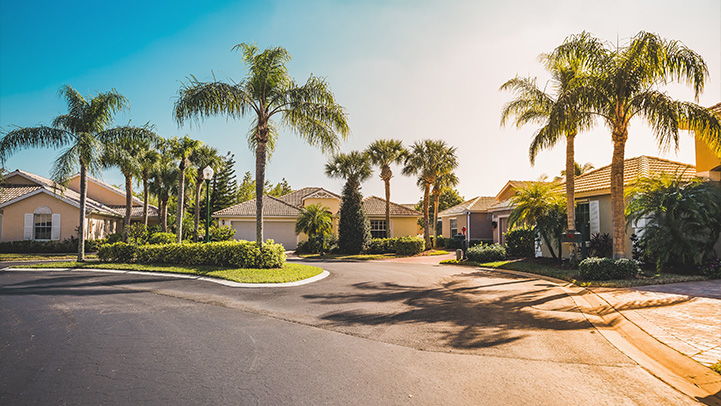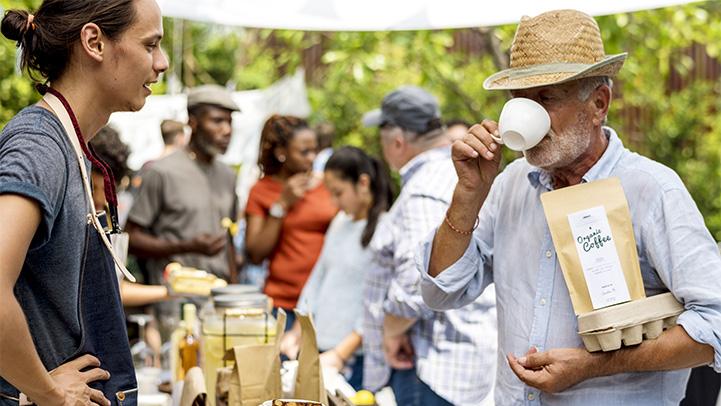Expanding human populations are driving the conversion of natural lands to agriculture and development. Half of all habitable land on Earth is devoted to agriculture, and farming and forestry activities generate 24% of greenhouse gas emissions worldwide. In Florida, agriculture is the second largest economic driver after tourism. Of course, we can’t stop farming, but we can retool how we grow, select, and dispose of our food in order to reduce water pollution, green house gas emissions, and habitat degradation. Cultivating food sustainably is good for us, our community, and our world.
With a little know-how and some practice getting your hands dirty, you can grow fresh, nutritious vegetables, herbs, and fruits without a trek to the supermarket. Even apartment and condo dwellers can enjoy tasty container-grown herbs and vegetables. Edible gardening can beautify your surroundings, reduce your carbon footprint, relieve stress, improve your fitness, and increase your access to safe, nutritious food. Grow socially by joining a community garden or grow solo with a home garden, and you’ll be part of a worldwide “slow food movement” that is good for people and the planet!
You don’t have to go on a diet to change your diet. Making a simple commitment to eat more plant-based meals and less meat is one of the most impactful changes you can make to conserve water, energy, and natural lands. Become a “locavore” and eat food grown locally and in season to help reduce greenhouse gas emissions generated from refrigerating, packaging, and shipping food over long distances. Supporting Suncoast farmers, grocers, and restaurants that are part of the blossoming farm-to-table movement supports our local economy, biodiversity, soil health, and food security.
On average, Americans waste about 238 pounds of food every year (one-fifth of the food they buy), costing them $1800 per year. In the US, food loss and waste account for 4% of greenhouse gas emissions, 14% of all freshwater use, and 24% of landfilled waste. Reduce food waste and save money with smart shopping, meal planning, and food storage. Donate edible food you can’t eat, and compost food scraps to help your food waste come full cycle as natural fertilizer to grow your garden.
“When we moved to a condo in Sarasota last year, we knew we would have limited vegetable gardening space. Through the internet I found Mindy [Hanak] coordinating the local Sarasota Community Gardens and immediately signed up on the wait list for a space. We are now into our second season. I have a passion for growing rare heirloom vegetables—Baker Creek Heirloom Seed Company is a favorite source. One of my recent successes is growing Cardoons, also known as wild artichoke. Without the community garden none of this would be possible. Mindy and the team of community garden managers work hard to ensure all gardening members are prepared to succeed in their individual gardening plans.”
— Bill Schroeder, Community Garden Member
Please tell us about your food-related success story. Here are a few questions to get you started: What changes are you making? Why? What has the process been like? What’s the impact? If selected, we will contact you for an interview to develop a feature story on the Green Living Toolkit.

Personal Benefits
Community Benefits

Eating more fresh plant-based food grown with fewer synthetic chemicals can improve overall nutrition and wellness. Gardening reduces stress, connects us to nature’s cycles, and grows friendships. Plus, gardening can keep you fit as well as fed!

Home-grown veggies and fruits can save money. Composting kitchen scraps and yard waste is a free, eco-friendly alternative to purchasing lawn/landscape fertilizers.

Community gardens and fruit forests are desirable amenities that enhance neighborhood aesthetics and instill a sense of community pride.

Increased consumption of plant-based locally grown foods reduces greenhouse gas emissions associated with long-distance transport and refrigeration. Organic farming improves soil health to sequester more carbon and eliminates use of pesticides and herbicides that can harm people and wildlife.

Communities that support sustainable agriculture are better insulated from food supply disruptions. Local farms and markets boost local economies, contribute to socio-economic stability, and reduce food insecurity. Community gardens grow relationships and strengthen social support systems.
Mind if we stay in touch?
We'll send you our free Toolkit Quick Reference Guide.
We'll never spam you or share your info. Unsubscribe at any time.
This site protected by reCAPTCHA and the Google Privacy Policy and Term of Service apply.
©2024 Science and Environment Council of Southwest Florida | Site by Chariot.